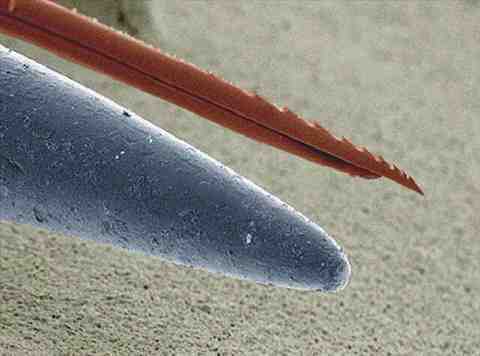Science tells us how to repel mosquitoes
Halibutboy Flatface stashed this in Outdoors
Stashed in: Science!, Awesome, Bugs!, Plants!, Out of Doors, Mosquito
This is basically everything you need to know about mosquitoes, unless you really love bugs. Malaria mosquitoes are attracted to stinky feet! Other mosquitoes don't care. Recommends a natural remedy that apparently really works.
As if we needed another reason not to have stinky feet!
But if we have Anopheles mosquitoes, then why don’t we have malaria? The answer, in part, is due to climate. According to Andrew Githeko, a Kenyan scientist who studies malaria, malaria only occurs in places where the average temperature is above 18C (64.4F). Below that, the mosquito dies before the parasite matures, and this prevents transmission. In Kenya, he discovered malaria already moving into new areas as the climate warmed. Fortunately, malaria is not endemic to the U.S. as it is in Kenya. And if the U.S. lacks a base of humans and mosquitoes carrying the parasite, then that prevents the spread of the disease.
These different genera and species not only differ in the ways listed above; they also differ slightly in what attracts them to hosts they wish to bite. Mosquitoes use carbon dioxide, heat, moisture, scent, and even vision to locate hosts. When they are sniffing us out, they hone in on a large number of chemicals. A 2000 study identified 346 chemicals from human hand odors, of which 277 were potential mosquito attractants.
The most significant chemicals mosquitoes use to locate us and bite us include l-lactic acid, ammonia, carboxylic acids, and octenol, in combination with one another. In experiments, scientists found that adding l-lactic acid to the scent of an unattractive person made them more attractive to Aedes aegypti mosquitoes, and vice versa. Additionally, the presence of carbon dioxide makes A. aegyptimosquitoes more sensitive to human skin odors.
In fact, a 2014 Australianstudy found that a mixture of 32 percent lemon eucalyptus oil provided more than 95 percent protection from mosquitoes for three hours, compared to a 40 percent DEET repellent that gave test subjects 100 percent protection for seven hours.
A 2013 study examined the ability of 20 different plant essential oils to repel malarial mosquitoes. Notably, rosemary, lemon, eucalyptus, neem, and pennyroyal each had no repellent effect. The three best were cinnamon, citronella, and thyme, which were repellent, irritating, and toxic to the mosquitoes. Additionally, they found that cumin, lemongrass, coleus, and thyme were irritants to the mosquitoes at all concentrations. Another 2013 study found that cinnamon repelled the Asian Tiger mosquito, and so did a plant called Herba Schizonapetae that is used in Chinese medicine. Yet another plant that proved effective in studies is Nepeta parnassicus, a species in the mint family related to catnip.
Unfortunately, plant based products evaporate quickly, which means they must be re-applied. But another study, published in 2001, tried the novel step of adding vanillin to the essential oils it tested on several species of mosquitoes. Vanillin, the primary component of vanilla (which is sometimes created synthetically and used as cheap vanilla flavor), extended the efficacy of the four plants tested (turmeric, kaffir lime, citronella and hairy basil). One commercial product that makes use of this finding is Dr. Mercola’s Bug Spray, which combines citronella, lemongrass, peppermint, and vanillin.
Okay, so which ingredients make most sense?
Cinnamon, citronella, and thyme?
Vanillin?
Citronella, lemongrass, and peppermint?
Lemon eucaluptus?
http://www.consumersearch.com/insect-repellent/repel-lemon-eucalyptus-insect-repellent
tl;dr Lemon-eucalyptus -- which is a type of tree (Corymbia Citriodora) that USED TO BE classified as a eucalyptus, not a combo of lemon and eucalpytus -- seems to be the champion for non-malarial mosquitoes.











6:29 PM Jul 01 2014